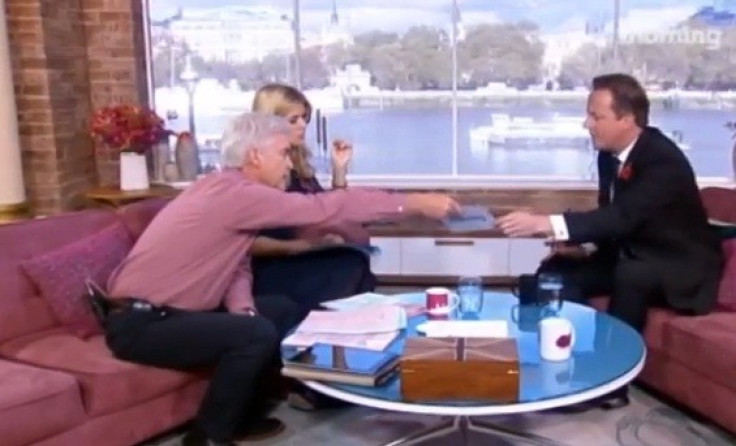Did Philip Schofield Commit Libel by Handing Alleged Paedophile List to David Cameron on This Morning?

Philip Schofield livened up breakfast television by ambushing the prime minister with a list of alleged paedophilic politicians on Thursday morning.
The usually cuddly Schofield briefly turned paedophile-catcher during an interview with David Cameron on ITV's This Morning show. He handed over a piece of paper containing the names of individuals named on the internet as suspected child abusers.
The presenter claimed he found the names easily, with just a quick Google search the previous evening.
But by showing Cameron the list in a moment of TV drama, could Schofield have stepped into the dangerous legal minefield that is British libel law?
In UK law, libel is defined as a defamatory statement that 'tends to' damage a person's reputation, exposing them to hatred, contempt, leading them to be shunned or avoided, or lower them in the estimation of 'right-thinking' members of society.
That seems a perfect description of what life must be like to be a convicted paedophile in society. And naming a person as a possible paedophile is about the most damaging thing it is possible to say about anyone these days.
Just ask Gary Glitter why he hides behind swathes of scarves, hats and big coats whenever he appears in public. Or ask the doctor how he felt when he was targeted by a hate mob which confused the words ' pediatrician' and 'paedophile' in the early 2000s.
Usually, spoken statements like Schofield's would be treated as potential slander, not libel. But not under the Broadcasting Act 1990, which states that defamatory statements made in a TV studio also qualify libel.
The laws are not friendly to journalists, with regular calls for urgent reform to prevent a chilling effect upon free speech, which critics claim is only of benefit to the rich and powerful.
Under law, a defamatory statement need only be seen by another pair of eyes for it to be libellous. By handed his note to Cameron, Schofield could have fallen into this trap.
In one famous case, 19<sup>th century writer Oscar Wilde sued for libel after a note which labelled him gay was seen only by him, the author - and crucially a valet at the club who handed it to him.
Wilde subsequently lost the case against the note's author, the Marquess of Queensbury - who devised the rules of boxing. He racked up huge expenses and was bankrupted as a result.
So Cameron may have done Schofield a huge favour in the studio by apparently refusing to look at the sheet he handed to him. That would mean Schofield's attention-grabbing antics failed a key test of what is libelous. That the PM probably had his own reasons for not scanning the sheet would be irrelevant.
The web was buzzing in the aftermath of Schofield's ambush with viewers claiming he had revealed a bit too much and that some of the writing could be discerned. That would render obsolete Cameron's refusal to digest the contents.
By bidding to expose potential paedophiles to the PM, Schofield, who used to co-host a children's show with a toy gopher named Gordon, took a major risk.
Phillip Schofield Hands David Cameron 'Visible' List of Alleged Tory Paedophiles on This Morning
© Copyright IBTimes 2024. All rights reserved.






